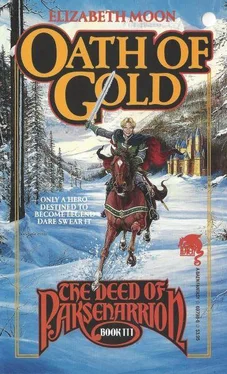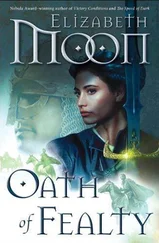“It’s been so long,” he said, “since I have campaigned with heavy cavalry that I have forgotten much. Sir Ammerlin, you must be sure to tell me when the horses should rest, and what must be done. A mounted infantry company moves very differently.”
Ammerlin thawed another fraction. “My lord, I am sorry that we cannot move faster; the prince said your journey was urgent, and must brook no delay. I know the Marshals think we are soft, but—” he patted his own horse, “these fellows were never meant for speed or distance. Yet in close combat, they are a powerful defense; we can ride down lighter cavalry without getting far away from you. We cannot, it’s true, ride into a heavy polearm company, but—”
“If we run into that,” said Kieri, “we’ll have to go around. Believe me, I appreciate the prince’s care in sending such an escort. But to make the best use of it, you must advise me.”
Ammerlin appeared to give up his resentment completely. “Well, my lord, they can work all day—if it’s slow—or a short time, if it’s fast. That’s the choice. I’d choose to go at their walking pace—a little slower than the light horses—and rest them at least every two glasses. And a long break at noon, of course.” Kieri, calculating this without moving a muscle, began to be sure that Dorrin would catch them before the border. “If we try to move out faster,” Ammerlin went on, “we’ll have a third of them lame in two days, and then what?” Leave them behind, Kieri thought, but did not say. He knew he would need them.
“Well,” he said finally, “let’s see how far we go. I would not ask haste, if it were not needed—I hope you understand that.”
“Yes, my lord.” Ammerlin looked much happier.
“About the order of march—” began Kieri.
“Yes, my lord?”
“What about sending some of the bowmen forward, as scouts?”
Ammerlin’s expression was eloquent. “Well—my lord—if you like. But we’re in Mahieran lands now—there’s no real need.”
“True, but then we’ll be used to that—when we come to other lands.”
Ammerlin chewed on this thought, and nodded. With a wave, Kieri returned to his own horse, and mounted. He watched as the bowmen got their orders and rode forward.
“That makes more sense,” said Garris at his side.
“They’re not used to maneuvering in hostile territory,” said Kieri.
Where the road was wide enough, the heavy horses went five abreast, the four ranks in front of him and the squires. Then his own tensquad (for he had explained that since they had no officer in charge, he must be near them), then the mounted infantry. Now that the bowmen rode as scouts, the pack animals were directly behind the Guard light horse. Kieri fretted, unable to see over the four ranks of large horses in front of him; he had always led his own Company, or had trusted scouts in advance.
By the time they stopped that night, at Magen, Kieri knew it would take them a full ten days or more to reach Harway on the border. Ammerlin agreed, reminding them that he had escorted the prince’s younger brother to the Verrakai hunting lodge, ten days on the road both ways. At the Marshal’s invitation, Kieri, the Kings’ Squires, and the other Marshals stayed in Magen grange, and after supper they deplored the slow progress.
“My lord, they will have plenty of time to deploy a large force—”
“I know. That’s why Paksenarrion wanted me to hurry. But they’re going to attack—large force or not—and I need the troops.”
“What about using yeomen from any grange nearby?”
Kieri shook his head. “Should I involve the yeomen of Tsaia in a battle to protect the king of Lyonya? No, if they choose to fight, I’ll welcome them—but I have no right to call them out.”
“Besides,” said Marshal Hagin, “not all granges would be much help. Perhaps the High Marshal is not aware that some granges in the east have nearly withered away?”
“No—if I’d known, I’d have done something.” Seklis scowled. “What’s the problem?”
“I don’t know. I hear things, from peddlers on the road, and that sort—and we all know about the troubles near Konhalt—and Verrakai.”
“Duke Verrakai has never been one of my supporters,” said Kieri mildly. Marshal Hagin snorted.
“I’d have put it somewhat stronger than that, my lord, begging your pardon. But he’s not as bad as his brother. That one—!”
“But my point is, crawling around the country like this, on the one good road, they’ll have time to set up an army—” Seklis bounced his fist on his chair.
“But not a very good one,” said Kieri. “What can they do at most—let’s look at the very worst.”
“Three cohorts of Verrakaien household troops,” said Seklis. “For a start.”
“Your pardon, High Marshal, but they won’t get more than two in the field this time of year,” said Sulinarrion. “I’ve a cousin who married into a Verrakaien family.” She held to that, and they considered what other forces might come: a half-cohort or so of Konhalts, ferried across the river, perhaps some local peasantry, ill-trained but formidable in numbers.
“What about Pargunese?” asked Kieri. They froze, staring at him. He went on. “The Pargunese won’t want me as king of Lyonya for several reasons. I defeated the Sagon of the west, many years ago—using someone else’s army, but I commanded. They know I will be a strong king, and they’ll have no chance to gain ground anywhere. And they hate elves.”
“But that would mean war between Pargun and Tsaia,” said Hagin. “Would they risk that?”
“If they could raid, and get back—with, perhaps, Verrakai’s connivance—perhaps not. And after all, it’s not Tsaia’s king they’re after.”
“Umm. You think Verrakai would let them through?”
“Yes—and blame the whole thing on them, as well.”
“Would the Pargunese be stupid enough to fall for it?” asked Lieth suddenly.
“You mean, what would they gain? Well, they’d not have me to deal with—and they don’t like me. And perhaps Verrakai has given or promised something else. A foothold on this side of the border? Gold? I don’t know, but just how many Pargunese cohorts could the Sagon move if he wanted to?”
“Could he move through Lyonya?” asked Marshal Sulinarrion of the Kings’ Squires.
“Not without starting real trouble,” said Garris. “We have garrisons all along the river—they’ve tried that before.”
“The Sagon of the west has eight cohorts, they say,” said Suriya. “But half of those are stationed along the northwest—”
Kieri laughed. “Yes—and I’m the reason. That leaves four—no more than two will be close enough to meet us, I daresay. So—a couple of Verrakai cohorts, a couple of Pargunese cohorts—and who will command those, I wonder?—and no more than one of Konhalt. What of Liart, Marshals? How many followers will they bring?”
High Marshal Seklis frowned. “I would have said there were no Liartians in Vérella, my lord. Yet there were. Gird knows how many are hiding in the forests.”
Kieri shook his head. “They let the rabbits run, companions, knowing they had hounds. They did not know, perhaps, that these rabbits had teeth.” The others laughed. “Indeed, my lord,” ventured Marshal Hagin, “you have the name of a fox, not a rabbit.”
“Indeed, Marshal, I shall have a name worse than that before we are done.” Kieri smiled. “But let’s take heart: though they oppose our seventy or so with their four or five cohorts, they may not suspect my own marching behind. Two against four sounds better. Despite the slow progress of our escort, I judge those heavy horses will do their work well when it comes to battle.”
Читать дальше












